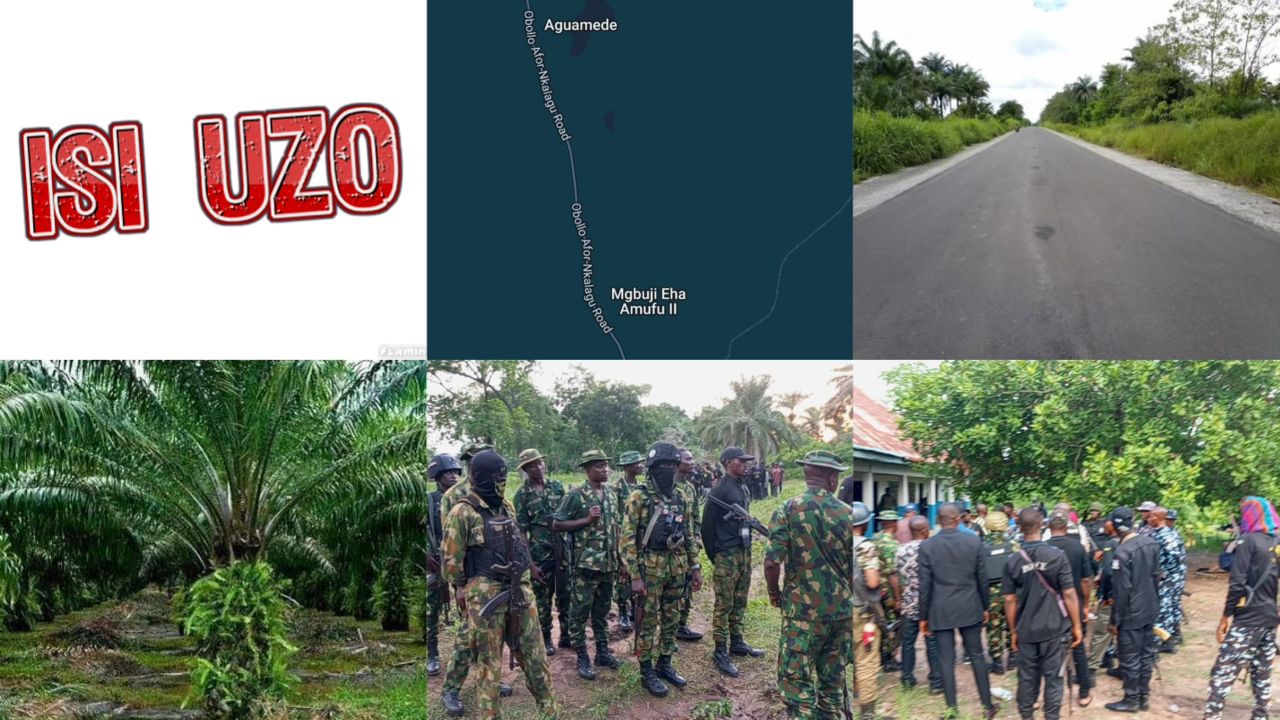News
Enugu exposes hidden agenda in Eha-Amufu killings, tensions, and reprisals
DDM News

Enugu, Nigeria – The security situation in Eha-Amufu, Isi-Uzo Local Government Area of Enugu State, has drawn attention following fresh reports of communal tension and attacks.
Diaspora Digital Media (DDM) can confirm that the area has become a theatre of violence over the past few years, resulting in several deaths, mass displacements, and deep-rooted fear among residents.
A notable voice, Kelvin Anikwe, also known as Papa Chelsea, has spoken out on his recent fact-finding visit to the troubled communities within Eha-Amufu.
According to him, his silence on the issue was misunderstood by some followers who felt he had turned a blind eye to killings in the South-East while criticizing similar violence in Benue State.
He clarified that the scope and pattern of attacks in Benue demanded immediate attention due to what he described as “systematic and concerted attempts to wipe out indigenous communities.”
In contrast, he stated that the incidents in Isi-Uzo, while violent, had complex underlying triggers that required a more nuanced approach.
Papa Chelsea, who has a background in security work, said he physically visited several settlements in the Eha-Amufu region, including Agu-Mgbuji, Ogbete, Ibeje, and Agu-Amede.
These communities border parts of Benue State and have long been vulnerable to spillover violence from clashes involving herders and farmers in the region.
He noted that during his recent trip, the only motorable road available was the 21.7-kilometre stretch constructed by the Enugu State Government under Governor Peter Mbah.
Structures such as smart schools and hospitals were under construction, but basic connectivity like mobile networks remained absent in the region.
While acknowledging previous waves of attacks between 2021 and 2022, he focused on a recent incident in the Agu-Amede community which appears to have triggered renewed tensions.
According to his findings, some youths from the area allegedly organized a targeted attack on a group of herdsmen, reportedly killing about 15 individuals.
He claimed the herdsmen were buried in shallow graves, and the event was even celebrated on local social media platforms, escalating the situation further.
The state and local governments reportedly intervened quickly, organizing meetings with community leaders and affected herdsmen to de-escalate tensions and broker peace.
Security personnel were deployed preemptively in some locations to prevent reprisals, though this did not stop further violence from breaking out.
Despite these efforts, armed men believed to be herdsmen later launched attacks on remote border settlements, further compounding the humanitarian situation.
Eyewitnesses allege that collaborators from within the Mgbuji and Eha-Amufu areas aided the attackers in locating the burial sites and exhuming the corpses of slain herders.
These bodies were reportedly transported back to the North in secrecy, with very little attention given to the incident on social media or national platforms.
Papa Chelsea criticized the silence of digital influencers and the selective outrage shown on social media when lives are lost, regardless of the identities of the victims.
He emphasized that although he opposes herders destroying farmlands and attacking communities, taking laws into one’s own hands by killing them is not a justifiable solution.
He described the reprisal attack as a tragedy that could have been avoided if early warnings had been heeded and peaceful dialogue maintained.
He commended the current Enugu State Government for its rapid response and deployment of security forces across the vulnerable settlements.
Papa Chelsea insisted that all lives matter and that peace must be prioritized over revenge in resolving the recurring violence.
However, residents and analysts have raised questions regarding the narrative that the local people were the first to attack the herders.
Some locals believe that such attacks are often retaliatory in nature, driven by long-standing grievances such as land encroachment, rape allegations, or the destruction of farmlands by cattle.
A community elder who spoke anonymously argued that the real trigger might have been the persistent harassment by herdsmen, which provoked angry youths to take action.
He noted that villagers in Eha-Amufu have long complained about the inability of security agents to protect them from invading herdsmen who graze freely on farms and often attack anyone who resists.
According to him, many attacks by herders go unreported until villagers respond with force, often resulting in further bloodshed.
Critics say that the tendency to blame local youths for starting the conflict ignores years of hardship, displacement, and loss suffered by the farming communities.
Another activist in the area told DDM that security presence often comes only after lives have been lost and villages torched.
They argue that the government must not only send troops but also provide a long-term peace and resettlement plan for victims.
This includes prosecuting known attackers, fencing off vulnerable borderlines, and disarming violent herder militias.
The Eha-Amufu issue is particularly complex due to its proximity to Benue State, where farmer-herder violence has escalated over the past decade.
The Tiv, Idoma, and other Benue communities have consistently accused Fulani herders of launching systematic land-grabbing campaigns.
These accusations have fueled a climate of fear and inter-ethnic mistrust in bordering states like Enugu.
The security implications of these cross-border attacks are grave and affect both social stability and food security in the region.
Over the years, multiple peace accords have been brokered between farming communities and herder groups in these areas, often with little lasting effect.
Many agreements collapse due to renewed provocations or the failure of security agencies to enforce terms of settlement.
Human rights groups have also criticized what they call a “two-tiered justice system,” where attackers with political or ethnic backing are not held accountable.
The situation calls for honest conversation and objective reporting, according to Papa Chelsea, who has vowed to turn his attention next to similar killings in Umunneochi, Abia State.
He invited the public to share verified information with him to enable him to continue exposing the truth behind these attacks and their aftermaths.
Meanwhile, communities in Eha-Amufu remain tense, with many internally displaced persons seeking shelter in safer areas or staying in makeshift camps.
Observers say that unless government moves beyond reactionary deployments and focuses on proactive intelligence, infrastructure, and justice, the cycle of attack and reprisal will continue.
As calls for lasting peace grow louder, analysts warn that without addressing the root causes, land disputes, failed governance, and ethnic tensions, lasting stability will remain elusive.
Eha-Amufu stands today as a tragic symbol of what happens when conflicts are not resolved with justice and mutual respect.
But it also remains a potential example of what can be achieved when truth, balance, and proactive governance replace blame and inaction.
Kindly share 🙏
For Diaspora Digital Media Updates click on Whatsapp, or Telegram. For eyewitness accounts/ reports/ articles, write to: citizenreports@diasporadigitalmedia.com. Follow us on X (Fomerly Twitter) or Facebook












